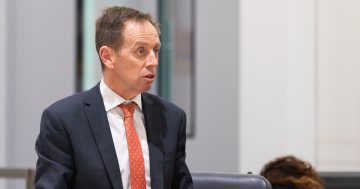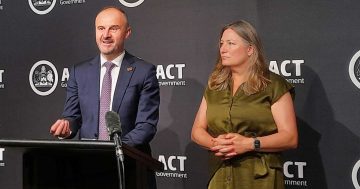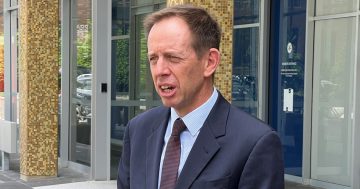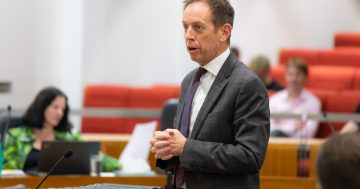
The trio of Green ministers: Shane Rattenbury, Rebecca Vassarotti and Emma Davidson. Photo: Michelle Kroll.
The ACT Greens have won unprecedented power within the new ACT Government but their heady success should not blind them or their supporters to the fact that Labor as the senior coalition partner will still hold the whip hand.
Three ministers is a dream result for the Greens, and combined with their three crossbenchers, will enable them to have an undeniable influence on the future of the Territory.
Leader Shane Rattenbury as Attorney-General and a member of the powerful Expenditure Review Committee which guides the budget elevates him to a key central position in the government.
He is now where Greens politicians in other jurisdictions can only fantasise of being. That is a credit to his grounded, measured and articulate performance that has found favour in the electorate and also benefited his new colleagues in the Assembly.
There is no doubt that the Greens can claim credit for key government achievements in transport and renewable energy, and they will be keen to pursue even more climate-related policies and the environment in general.
But this is where Chief Minister Andrew Barr has made a virtue of Labor’s partnership with the Greens and appropriated policies such as light rail, renewables, and now the big battery and the sustainable household scheme, which Mr Barr as Climate Action Minister will be responsible for.
In fact, the Cabinet design reveals a sharing of responsibilities that gives the Greens access to their favoured areas but also ensures the government retains a controlling interest.
There are overlaps and points of conflict in climate change, housing and development, and a look at the administrative arrangements shows the Labor ministers such as Mr Barr, Yvette Berry and Mick Gentleman, who retains Planning despite community disquiet about his performance, will for practical purposes have the upper hand.
Development and planning are perennially hot issues in the ACT, on which the Greens campaigned hard, reflected in Rebecca Vassarotti securing Environment, Heritage, Homelessness and Housing Services, and Sustainable Building and Construction.
But Ms Berry will control housing regulation, strategy and policy, public housing and suburban land development, and with Mr Gentleman ensconced in Planning, the Greens may run into a brick wall when it comes to achieving some of their goals.
Post-COVID economic recovery and job creation is a stated government priority so there may be battles ahead when it comes to development versus the environment or imposing greater sustainability requirements on cost-averse developers and builders.
While Mr Rattenbury retains responsibility for climate policy, Mr Barr, who also holds all the economic cards, will also look after renewables, and climate change adaptation and resilience.
While the Greens may be outgunned in Cabinet, their foot soldiers on the crossbenches, especially if they are prepared to make alliances with the Liberals, will play an important role in holding Labor to account and bending policy arms.
Obviously, the Cabinet is a product of give and take, with inherent policy fault lines, but Mr Barr says it also reflects a big agenda and the need to share the load.
He also flagged a greater role for MLAs in the committee process, so the entire Assembly can be more involved.
He believes the tensions within Cabinet will be a good thing and lead to positive outcomes, but there will have to be compromise and innovation.
The Greens won’t be able to win every fight so they may have to be more compromising and innovative than Labor, and more strategic.
But in many ways, the Greens have already changed Labor for the better and the electorate has spoken on climate change, from which many policy decisions will flow – from urban design to energy to transport.
There are going to be rows and spats but also, if Mr Barr can be believed, collaboration and consensus.
This Cabinet could be the ACT’s most creative and productive yet, to guide the economic recovery and set a course for a more sustainable future.




















